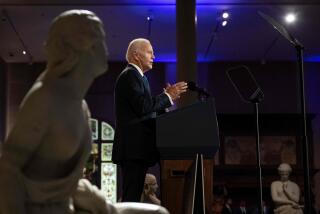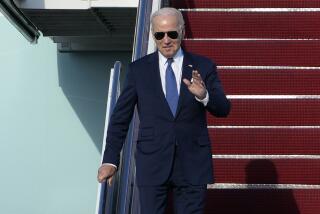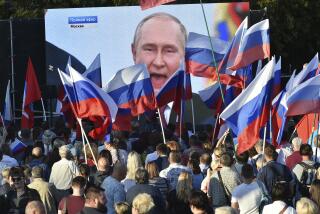Down and Out in the Soviet Union : Why Problems Back Home Threaten U.S. Security, Not Enhance It
- Share via
The outcome of the current Bush-Gorbachev summit will be determined by the willingness of the two superpowers to deal in a constructive fashion with three considerations glimpsed only dimly when they last met in Malta. Now all three are clear: One is a fact; one is an aspiration, and the other is a realization.
The fact is Soviet weakness. Today, Moscow’s network of military alliances has collapsed; its only firm claim to superpower status is its nuclear arsenal. Its system of economic planning has failed utterly. Central authority itself is in jeopardy, as nationalism surges not only around the periphery but also through the Russian heartland. Political fragmentation is so intense that the two largest vote-getters in the Russian Republic’s presidential election this week were a Gorbachev critic from the left--the winner, populist Boris N. Yeltsin--and an opponent from the right--hard-liner Ivan K. Polozkov. Yet Gorbachev, as Thursday’s Times Poll reported, remains popular.
The aspiration is European stability. Here the United States must take Soviet weakness into account without exploiting it, particularly on the German question. Washington--and the Germans--want to see the new Germany part of NATO. Soviet public opinion, as The Times Poll found, overwhelmingly desires a neutral Germany.
Yet such a solution virtually assures the European instability everyone fears. What must be found--and this may take some doing--is a structure that keeps Germany firmly in the stabile community of Western nations without frightening the Soviet people and humiliating and further weakening their leaders. It is not surprising that some are touting a sort of desperation candidate known as the 35-nation Conference of Security and Cooperation in Europe as a possible successor umbrella for Europe. The 15-year-old organization already includes the Soviet Union and the United States as members and so carries no debilitating Cold War baggage. Something, though not just anything, is needed.
Finally, point three: The realization is that neither superpower can dictate solutions. The Soviets can influence, but not exercise, a veto over the shape of the new Europe. The United States can isolate itself or put aside domestic politics to join the stabilizing process of economic interchange with the Soviets wisely begun by the Europeans. A destitute, desperate Soviet Union is in no one’s interest. Washington ought to sign the trade agreements it has concluded with Moscow as soon as possible.
More to Read
Sign up for Essential California
The most important California stories and recommendations in your inbox every morning.
You may occasionally receive promotional content from the Los Angeles Times.













